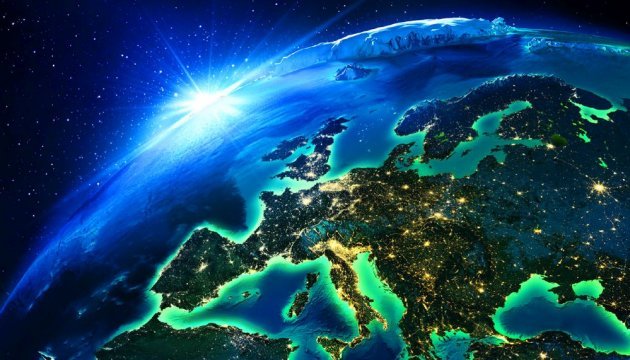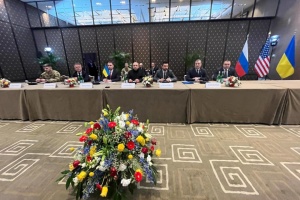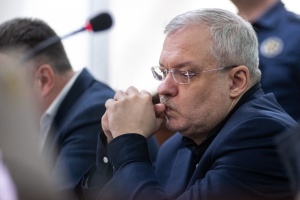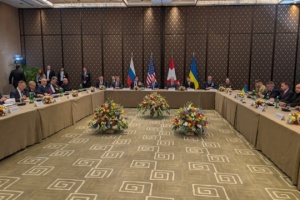
Shattered and firm illusions. Ukraine in global dimensions of modern world
Speaking about Ukraine in modern global dimensions, I will start from bitter and unpleasant part – our national lessons. We must admit that Ukraine was too passive for all 25 years of its independence. We were balancing between the development vectors, waiting for good proposals from the East and the West, avoiding making responsible and radical decisions. In some ways, this policy was justified and even comfortable. However, the most important thing to be said about the previous period is that such a policy was forced.
We could not take the liberty of sticking to a decisive foreign policy course in view of the internal weakness and immaturity of our statehood. After all, since 1991, we have begun to build our sovereignty without having many necessary qualities and resources for this.
People express various assessments now, saying Ukraine achieved its independence too easily. I would say that we were in the imperial servitude but got liberty only after the prison collapsed. At the same time, many Ukrainians missed that prison and the first decades saw the struggle between the old and the new, between the need to build a new state and an instinctive desire to return to the past or at least to keep its main attributes.
For 25 years, we have been talking about reforms, and we have just come to reform the Soviet system of pensions, health care, education, self-government and many other areas. Our foreign policy was also unwise and inconsistent. The vectors changed, the motion was mimicked, and in the end, the resulting vector turned out to be zero. We also should mention the destructive activities often carried out in relation to the security and defense sector – the constant reformation without a clear goal, the sale of all possible property, the degradation of the Armed Forces, law enforcement agencies, and special services. This also includes a sharp decrease in the personnel of the Armed Forces, the aging of most armaments and military equipment.
Ukraine suffered all those problems when the Russian aggression started in 2014.
We were forced to test out our national maturity by rebuilding the army, upgrading intelligence and counterintelligence bodies and carefully launching the economic growth process in an extremely short period of time. I would like to emphasize that we had to do all of that amid the difficult war with an opponent, which had been preparing for it for a long time, and which we considered to be our friend and brother.
The latter led to the most important "loss", having shattered our illusions.
We no longer believe in the brotherhood and equal partnership with Russia as we see instead the revenge policy of the reviving empire, which considers the existence of the independent Ukraine to be unacceptable. We no longer believe in treaties and memoranda on security guarantees, but we are aware of the need to build our own armed forces and mobilize domestic resources to defeat the enemy. We understand that it is impossible to infinitely discuss the vectors of integration and the foreign policy strategy of the state, especially if our opponents clearly play an external opponent's hand.
Finally, we clearly understand that there is simply no alternative to the development of the independent Ukraine other than the European one.
However, the European path should not become another firm illusion for us, and another, mutual, disappointment. To avoid this, we need to clearly and objectively understand what happens in the world around us, as long as we are standing at the beginning of this path. What is present-day Europe? What is present-day Ukraine? Can we help each other? What are our goals and strategic priorities?
I would like to offer some of my insights into these issues.
The first one relates to my traditional topic – the global security and hybrid threats to the existing world order. I have already published several articles on this subject, and our Institute [the National Institute for Strategic Studies] prepared a fundamental monograph on the world hybrid war.
However, I would like to focus not only on threats faced by the civilized world but on the opportunities that are opening up.
First of all, we must understand clearly which global challenges have changed and which of them remained immutable.
It would seem that we live in the epoch when the incredible became obvious. The United Kingdom leaves the united Europe, while Turkey conducts its referendums in the EU member states. That communist China is now the main driver of the liberal economic globalization, and the United States is turning to a policy of self-isolation and trade protectionism. Moscow awards the medals "For the return of Crimea", and the warriors of the new Caliphate massively execute hostages in the Middle East.
The UN Security Council has become a controversial club owing to the consistent efforts of the Russian diplomats. European far left political groups unite with the far right ones to support Putin and a common hatred for the European integration. The regional parliaments in northern Italy now discuss the possibility of recognition of the Russia’s annexation of Crimea, while Iran organizes the delivery of food to the blockaded Qatar.
This could have seemed fantastic just a few years ago. Now the world has long gone beyond the traditional understanding, beyond the limits of traditional logic.
However, not everything is lost! We must understand that the current crisis is not the doomsday of the civilized world. It’s only a temporary loss of course and favorable wind. Some provocateurs and blackmailers try to benefit from the current situation, but their successes are temporary, and long-term prospects are obviously disappointing.
The concept of a hybrid war initially meant that the aggression is waged in a comprehensive manner and includes an informational and propagandistic component, the so-called organizational weapons, economic and diplomatic pressure, the military operations are carried out secretly, using illicit armed formations. The boundary between war and peace disappears before our eyes.
You think you live in a state of peace, friendship and strategic partnership, while you have already become a target for the large-scale military operations against you. You can never be sure that the war is over, no peace treaty or cease-fire agreement can no longer be accepted in all good faith. If you resist, the aggressor will sincerely resent but simultaneously wage a war to completely destroy you.
Do not be misled with the adjective "hybrid" as it is a full-fledged war, which uses an extremely powerful arsenal of methods to destroy the enemy. Currently, hybrid weapons are used not only against Ukraine but against the West also. Unfortunately, we should admit that such weapons are used successfully. Why do I say so? The signs of "success" are manifested in the fact that the victims of hybrid aggression are not ready to admit that they have indeed fallen victims to the hybrid war.
The United States is a striking example. Of course, the victory of the incumbent president was reasoned by many factors, including the desire of citizens to have new politicians who offer simple solutions to complex problems. However, what was the most important result of those elections?
First, it became apparent that Russia is ready to intervene and do intervene in the elections in other states. This seemed impossible just 5-10 years ago. However, having revived the practices of the Soviet Union and realized that the democratic model of the state is limited in its capacities to respond to hidden threats to its security, Russia has embarked on a large-scale and generously financed offensive. The United States, as well as other democratic states, came under pressure. Extremely insignificant expenditures on such activities at the level of 4-5 billion dollars produce a totally explosive geopolitical effect.
And this effect led to the second consequence of the American elections – the chaoticization of political space of the democratic states. We see that the United States cannot get out of the process that began last year. Regular reports of the U.S. intelligence and counterintelligence bodies show how much Russia did to cast doubt on election results, to erode trust between political leadership and its main institutions and, if possible, to corrupt / bribe certain officials. Russia will continue to use such a scheme as it is not complex, but extremely effective.
The same is about Europe, which is also under attack. However, the vulnerability of Europe is reasoned by its civilization specifics. Europe has got used to playing by the rules, its position is always open, formed on the basis of free exchange of thoughts and rational argumentation. This is the strength of European politics, the attractiveness of the European home for many people, including Ukrainians. However, democratic procedures, pluralism of thoughts and political competition often become a weakness amid a total war. The experience of the Second World War proved that when relatively democratic countries such as Czechoslovakia and France became an easy prey to the aggressor, and the European continent became a battlefield between the totalitarian systems.
The current hybrid aggression, either from Russia or from the side of Islamic radicals, is well adapted to the European liberal environment, it parasitizes democratic institutions, shamelessly enjoys the freedom of speech, complementing it with violence and the instigation of fear.
We should not even look for prophecies about the consequences if Europe does not do anything about this. We should just look at Ukraine. An example of Ukraine three years ago is precisely what awaits Europe if it does not admit living in the new reality.
However, I would not like to be totally pessimistic as some countries of Europe succeed not only in defending but moving on to a cautious offensive as well. The victory of Emanuel Macron in the presidential election and the loss of the Kremlin-supported party of Marie Le Pen in the parliamentary elections in France are vivid examples. The same is the loss of the Italian party “Five Stars Movement”, another proponent of Vladimir Putin, in the regional elections. While meeting with Putin, Macron firmly debarred the representatives of the Russian foreign media the right of being identified as journalists, calling them propagandists, in fact, the ones they have actually been for a long time. So there is a progress, which inspires good hopes. We look forward to the elections in Germany.
Another topic I would like to touch on is Ukraine's role in overcoming the current crisis in Europe.
Recently, our Western partners have been seeing Ukraine as a problem for Europe. In fact, now Ukraine is more likely to contribute to solving many problems, including in relations between Europe and Russia.
In order to realize this, Europe needs to get rid of illusions about Russia the same as Ukraine did. When military units of the Western Military District of the Russian Armed Forces massively receive the status of the strike forces, and 200,000 troops are being trained for the West-2017 drills, then Europe must probably wake up from its complacency and to understand that the loss of 1-2% of the market of European products due to sanctions is the smallest of the problems that the Old Continent will face, and the increase in defense spending is payment for the right to preserve their countries.
We highly appreciate the consolidated position of the European community in supporting our civilized choice, state sovereignty, and territorial value. We are grateful for the concrete measures, which are being taken by our European partners despite the internal contradictions and the unfavorable situation: approving the economic part of the Association Agreement and the visa regime liberalization. At the same time, we can not but worry about the main problem of the modern Europe, which is the loss of some of the landmarks of development and the variability of the remaining ones.
The White Paper on the Future of Europe provides for 5 scenarios:
The first is the continuous development of the current course;
The second is "nothing but a single market";
The third is "those who want more, do more". This scenario reflects the idea of Europe of different speeds;
The fourth is "to do less, but more efficiently";
The fifth is "to do more and more together".
It is difficult to predict what course Europe will choose. However, we are confident that relations with Russia, relations with America, the place of Europe in the modern world and its mission are the issues that require a new qualitative level of European consciousness and European solidarity.
Finally, I would like to say a few words about our priorities.
The first and foremost priority is the European integration of Ukraine, which is an integral part of the overall course towards the Euro-Atlantic integration. The recently adopted amendments to the Law of Ukraine "On the Principles of Internal and External Policy" open up new opportunities for the implementation of the Euro-Atlantic course of our state. And although the political situation is not very favorable for the integration of Ukraine into NATO, there are topics of particular interest both for us and NATO. First of all, it is the Ukrainian experience (including combat one) against the Kremlin hybrid aggression.
The second priority is the development of strategic partnership with the United States of America as a key priority of Ukraine's foreign policy. This issue remains to be a priority in spite of the political problems the United States currently faces. The integration into the European Union, rebuffing Russian aggression, ensuring stable peace and economic development of our state cannot be achieved without a successful interaction with the world's largest power and the most authoritative global player. Currently, the most urgent task for bilateral relations is the restoration of the effective intergovernmental cooperation mechanisms, such as the former Kuchma-Gore intergovernmental commission. The updated commission could discuss granting Ukraine the status of a strategic non-NATO ally of the United States and providing Ukraine with comprehensive military assistance, including the lethal weapons. As the meeting between the presidents of Ukraine and the United States clearly showed, we can rely on the support of the United States on many issues.
The third priority is further cooperation with Europe on the issue of counteracting Russian aggression. The peculiarity of this aggression is that Ukraine, Europe, or any other world power cannot stop it on its own – this is possible only through joint efforts. Further consolidation of efforts on the European continent, precise analysis of the situation and coherence of action are the guarantees that the world will not further immerse in the chaos.
The fourth one is to become a security "donor" for the entire European community. The new European security system should take into account the experience of our response to the hybrid aggression as a new type of threats and challenges. The Ukrainian struggle and the European solidarity will help to clearly identify the masked enemy and expose its subversion. And this is not only about the obvious threat from the East, but also about the internal diseases of European democracy, the symptoms of which we clearly see in our own experience.
The fifth priority is the maintenance of the sanction regime. For its part, the United States has taken new important steps, realizing that the Kremlin has crossed the boundaries of the international order. Fixing sanctions at the level of the US law, if it happens, will be an important signal to the world that the United States is ready to engage in a struggle for the world peace, despite all the political turmoil.
The position of Europe remains a problem. Each time the process of sanction extension turns into a rigid European debate. And although Europeans are still able to solve this problem, there is a risk that sanctions will be lifted at a certain point. Abolition of sanctions will surely hurt Ukraine, but Europe will lose much more as it will thereby recognize the right of the aggressor to rebuild the world.
The sixth priority is strengthening Ukraine’s positions on the international platforms. UN, OSCE, regional security structures remain critical to defending our interests.
The achievement of these priorities, their strict observance in an increasingly changing world, a reference point for cooperation with our traditional and new partners in the face of hybrid threats is not only an important guarantee of effective counteraction to the aggressor but also the formation of solid foundations to secure a decent place for Ukraine in the new system of the international relations.
This is the path of Ukraine's historic civilizational choice.
I believe we will travel this path.
Volodymyr Horbulin, Director of the National Institute for Strategic Studies
June 22, 2017
* The point of view of the author may not coincide with the agency’s standpoint




